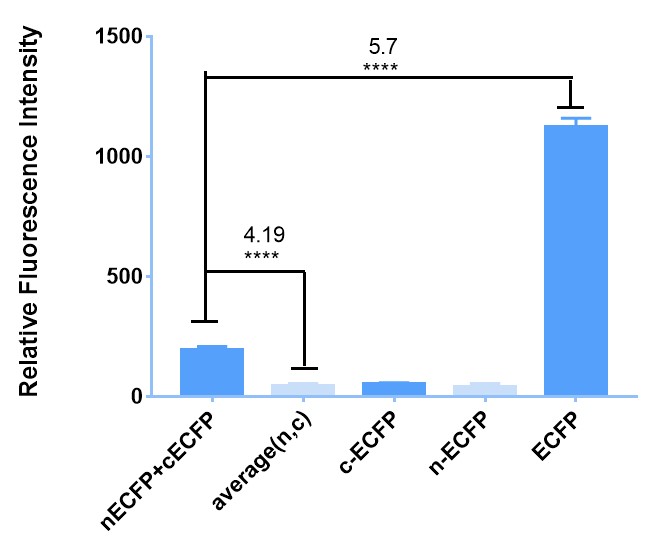Difference between revisions of "Part:BBa K2886012"
| Line 12: | Line 12: | ||
BiFC, a technology put forward in 2012, is aimed to visualize the interaction of two proteins. CECFP and nECFP are the C- and N-terminal of ECPF (BBa_E0020), which is a classical part that has been used 87 times till 2017. And we split this fluorescent protein at the site A155 into two parts. If these two parts of BiFC bind with each other, and they will emit fluorescence just as complete ECFP. | BiFC, a technology put forward in 2012, is aimed to visualize the interaction of two proteins. CECFP and nECFP are the C- and N-terminal of ECPF (BBa_E0020), which is a classical part that has been used 87 times till 2017. And we split this fluorescent protein at the site A155 into two parts. If these two parts of BiFC bind with each other, and they will emit fluorescence just as complete ECFP. | ||
| − | [[File: | + | [[File:Figure1_for_cECFP.jpeg|600px|thumb|left|'''Figure 1:''' The sketch map of BBa_K2886013 & BBa_K2886012 and the result of their interaction in E. coli induced under 4 ℃. (a) BBa_K2886013 & BBa_K2886012 can bind with each other through the electrostatic attraction of leucine zipper and emit fluorescence. (b) The background fluorescence of nECFP , cECFP and their average value (average(n,c)). Fluorescence emission of the mixture of nECFP and cECFP shows a 4.19 folds of intensity. And the original ECFP shows a 5.7 folds of intensity compared to original ECFP (BBa_E0020), exceeding the less than 10-fold result reported in literature.]] |
<br style="clear: both" /> | <br style="clear: both" /> | ||
| Line 20: | Line 20: | ||
To further demonstrate the reliability of our BiFC system, we also do some similar things in 293T cells. We add outer-membrane and transmembrane domain to it as well as substitute the leucine zipper with GS linker. The result suggests that our BiFC also works. | To further demonstrate the reliability of our BiFC system, we also do some similar things in 293T cells. We add outer-membrane and transmembrane domain to it as well as substitute the leucine zipper with GS linker. The result suggests that our BiFC also works. | ||
| − | [[File: | + | [[File:Figure2_for_cECFP.jpeg|700px|thumb|left|'''Figure 2:''' The structure of BiFC in Hela cell and the results of tests. (a)We construct 4 plasmid, whose inner-membrane domains are A: 1 GS linker + cECFP, B: 1 GS linker + nECFP,C: 2 GS linkers + cECFP and D: 2 GS linkers + nECFP. (b)The fluorescence intensity of after adding VEGF (AB+) has a 1.43 folds compared with before (AB-) in the A+B group. And in C+D group, it’s 1.24 folds.(c)Relative fluorescence intensity at different cotransfection in A+B group. Relative fluorescence intensity is evaluated by grey level measurement of ImageJ. They all show apparent differences, so it’s safe to conclude that our BiFC system works.]] |
<br style="clear: both" /> | <br style="clear: both" /> | ||
Latest revision as of 20:06, 17 October 2018
LEUCINE_ZIPPER-cECFP
Usage and Biology
BBa_K2886012, composited by Part:BBa_K2886006and Part:BBa_K2886004 is one of our best composite parts, which is used to confirm our BiFC system. Actually, our BiFC (bimolecular fluorescence complementation) system consists of two chains encoded by two paired parts: BBa_K2886013 and BBa_K2886012.
BBa_K2886013 and BBa_K2886012 are two inner-membrane domains constructed according to the rules of our STEP system. Both two chains have a leucine zipper (BBa_K2886006) that can bind with each other due to electrostatic attraction automatically, and that’s why we don’t need outer-membrane and transmembrane domain in these composite parts to help them get close enough. BBa_K2886012 has the cECFP domain (BBa_K2886004) and BBa_K2886009 has the nECFP domain (BBa_K2886005), which is the core of BiFC.
BiFC, a technology put forward in 2012, is aimed to visualize the interaction of two proteins. CECFP and nECFP are the C- and N-terminal of ECPF (BBa_E0020), which is a classical part that has been used 87 times till 2017. And we split this fluorescent protein at the site A155 into two parts. If these two parts of BiFC bind with each other, and they will emit fluorescence just as complete ECFP.

We carry out this experiment with E. coli. Firstly, we transfect E. coli BL21 with plasmids carrying BBa_K2886013 and BBa_K2886012 respectively. Then, when they express enough cECFP and nECFP, we lyse the bacteria with ultrasound and mix them up to emit cECFP and nECFP to a same system. At last, we measure the fluorescence with plate reader compared with negative and positive controls. The result shows that our attempt does succeed and it might be reliable for more complicated conditions.
To further demonstrate the reliability of our BiFC system, we also do some similar things in 293T cells. We add outer-membrane and transmembrane domain to it as well as substitute the leucine zipper with GS linker. The result suggests that our BiFC also works.

To sum up, using BBa_K2886013 together with BBa_K2886012, we confirmed the reliability of the BiFC system we designed preliminarily, accumulating experiences and lying down bases for further experiments and demonstrations. If you want to test your own BiFC system in a convenient way, you may try this method to give you help.
Sequence and Features
- 10COMPATIBLE WITH RFC[10]
- 12COMPATIBLE WITH RFC[12]
- 21COMPATIBLE WITH RFC[21]
- 23COMPATIBLE WITH RFC[23]
- 25COMPATIBLE WITH RFC[25]
- 1000COMPATIBLE WITH RFC[1000]
